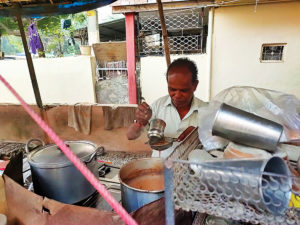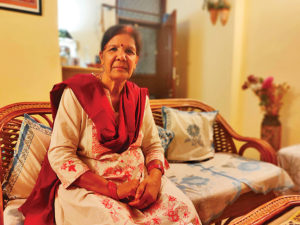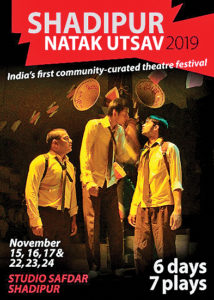Studio Safdar has chosen to involve the community in choosing plays which will be performed in their midst in Shadipur, far from the elite Mandi House area
“Naatak dekho, nataak dekho, Shadipur mein naatak dekho,” sing a group of people out loud in the congested street of E block in West Delhi’s Shadipur. From kids to old persons, a scattering of people try to figure out and simultaneously enjoy the performance of this group of men singing and chanting to promote a theatre festival starting from November 15 in the area.
Preparations for the first community curated festival are going on in full force as Studio Safdar, an independent, non-funded space for arts and activism, is gearing up to give the residents of Shadipur area a six-day theatre festival.

This festival in its first edition aims to spread awareness on topics of public interest such as cleanliness and so on, through the help of theatre.
Yogendra Yadav, 33, who lives in Shadipur, is watching as his son persistently asks him, “When are you taking me there to see this?” The child is pointing at the promotional event in his neighbourhood.
“I am hearing it for the first time that such an event is taking place in our area. I had no idea that a theatre studio also exists. I will try to make it on one of the days, given I’m free. But I will definitely send my son with my father to the festival,” says Yadav.
The theatre festival is set to showcase the first play titled Ek Square Metre Khushi by a Delhi-based theatre group Peshawar Maujkhor.
Within a span of nine days, the theatre festival is set to showcase seven plays which span genres like romance and social issues. All the plays are set to take place in the practice-cum-performing hall of Studio Safdar, which can accommodate 60-70 people at a time.
As the theatre festival is happening keeping in mind the residents of Shadipur, tickets are priced at Rs 20. For the outside public, donor passes are available at Rs 200. The studio formed a curatorial committee of five persons who are residents of Shadipur area.
Among these is Ravi Kumar, 52, a tea stall owner, who is living in the area since 1974. Earlier living in Paharganj area, the family relocated to Shadipur in 1974. Before opening the tea stall, Kumar was working as a commercial photographer in a studio in Kamla Nagar market.

As he continues to speak, we notice on his hands the burns of the chemical used during the production stage in a photo studio. “I left that profession because the skin of my hands was getting messed up day by day,” says Kumar.
The people of Studio Safdar used to come to Kumar’s tea stall to have tea, and with time they became familiar with each other. “I got to know that it’s a theatre studio when I used to go there to deliver tea,” says Kumar.
He started to attend a few plays in the studio, and developed an interest. He readily agreed to become part of the curatorial committee and went for the three-day screening of the 56 plays.
“I saw six-seven plays and after the three days of screening we had to filter out seven plays out of the 56. It was a very new and interesting process for me. That they considered me to sit among them and choose what they’re best at,” says Kumar.
He says he was “nervous during the first few minutes of the screening. I was sceptical about what to say when they asked me about each play. I’m not familiar with the terms and whatnot.”
Kumar has been given pamphlets to distribute. Every day, whenever he gets time, he hands them out to residents of the area.

“If you think about West Delhi for instance. The whole of West Delhi, it’s actually shocking that you don’t have a single cultural space of this kind or you don’t have a good book shop,” says Sudhanva Deshpande, Director at Studio Safdar, referring to the lack of the cultural spaces in West Delhi.
“In other words, I’m trying to say is that the cultural geography of Delhi is very-very lopsided,” says Deshpande.
About forming the curatorial team, Deshpande says, “They were apprehensive in the beginning when we called them up. But we really wanted them to help us select these plays.” He continues, “So it was a process by which one got people to think about the fact that you don’t have to be hi-fi artist to have a sense of what is a good play and what is not.”
Deshpande informs that all the theatre groups which are participants have been paid a very “small amount.” “They didn’t fuss over that at all. They were more than happy to be part of this festival. We have very limited funds, and have asked some members to host people coming from outside for one night each, providing dinner and lodging,” says Deshpande.
Kamlesh Kumar, 62, who prefers calling herself a gardener, is also part of the curatorial team. Sitting in her apartment on the third floor of the building in which Studio Safdar is located, Kumar says that she is excited about hosting a dinner on the terrace garden.
A retired MTNL employee, Kumari is connected to the theatre world through her daughter, who is pursuing a PhD degree from JNU. Her daughter is also part of the theatre festival.
But its Kumari, who is a member of the curatorial team, got interested in the things Studio Safdar does when she shifted to the area in 2012.
“I wasn’t hesitant when they offered me the role of selecting plays because I was indulging myself anyway because of my daughter. I saw many plays downstairs on a screen. After watching the plays we (the curatorial team) discussed amongst ourselves before sharing our thoughts with the team of the studio,” says Kumari.
She says it was a hard task to shortlist the plays as “some plays had good acting, while some had a good script. But after a discussion lasting three-four hours we were able to shortlist 10 plays. Four plays are kept as a backup, in case some group is not able to make it due to logistics,” she adds.
Iqbal Hussain, 37, who runs a car workshop in Sahibabad, is another resident of Shadipur who became part of the curatorial team.
Hussain had to juggle work at his workshop while also managing to see the plays. “I transferred six plays in my phone. For three days, at any point I was able to, I was seeing these plays. If one day I failed to see during daytime, then after having dinner, I would do so,” says Hussain.
“Some plays are really interesting and got me excited to continue watching them during the working hours too,” says Hussain.
He says he is quite excited to see this “first and one-of-a-kind festival in the area. I’ve been telling my neighbours and family members to come and enjoy this event. Because such a thing has never taken place in this side of the city,” says Hussain.
The seven-play theatre festival is set to commence from November 15 and will last till November 24 in Block E of Shadipur. The organisers remain excited to present something which the residents have not seen it before.





